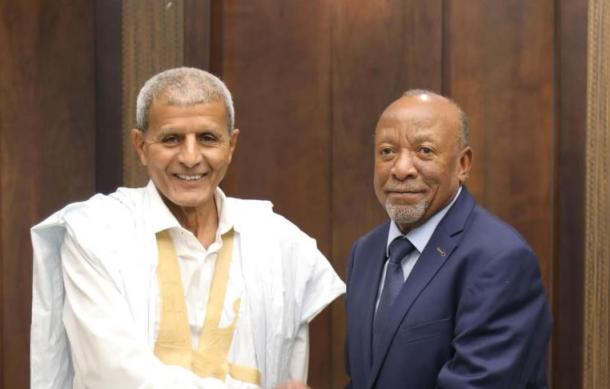
The conflict between the Sahrawi Arab Democratic Republic and Morocco continues to revolve around the unresolved status of Western Sahara and the delay in holding a referendum for self-determination.
Tensions persist, with sporadic violence and ongoing diplomatic efforts aimed at finding a lasting and peaceful solution to the dispute.
The special envoy of the Saharawi Arab Democratic Republic, Ambassador Hamdi El Jalil Aali, paid a courtesy visit to President Nangolo Mbumba to provide an update on current developments in Western Sahara, which is described as a war.
The referendum for Western Sahara has been a longstanding issue involving Morocco and the Sahrawi Arab Democratic Republic to allow the people of Western Sahara to determine their political future.
Despite the UN's interventions 30 years later, the situation hasn't progressed.
According to Ambassador Hamdi El Jalil Aalio, the language used to describe what is happening in Western Sahara has changed, with thousands of refugees in dire need of food, electricity, and healthcare.
He says the problem remains an African country occupying another, and without respecting borders, African countries can be at war.
He also raised concerns about the exploitation of Western Sahara's natural resources.
There is currently an ongoing fight at the European tribunal, so the agreements between the EU and Morocco should not include Western Sahara.
Another request was made for President Nangolo Mbumba to intervene with Zambia to prevent them from cutting their ties with Western Sahara, to which Dr. Mbumba said he would discuss the matter with Zambia's government.
Overall, peace and unity were emphasised.
President Mbumba says Namibia will continue to support the Saharawi people's pursuit of independence and human rights.
He says the process of using the UN's agreement to have a referendum for independence elections is a good method, but it requires all parties involved to be willing and honest. However, Morocco has never been interested in finding solutions.
The United Nations, African Union, and other international bodies continue to advocate for a peaceful resolution to the conflict based on the principles of self-determination and respect for territorial integrity.





